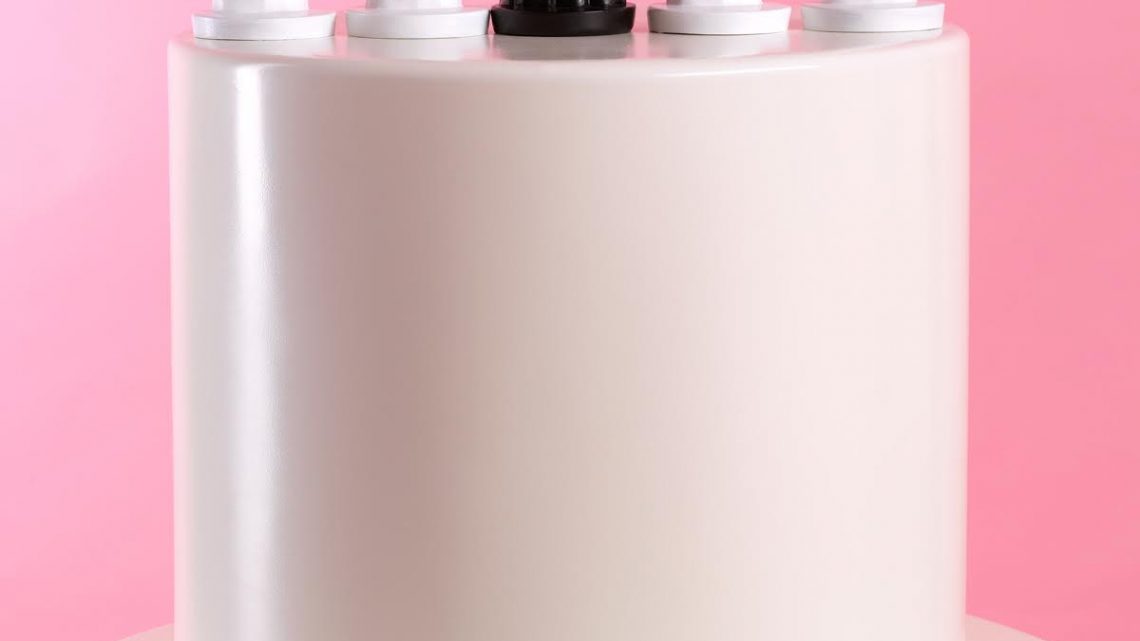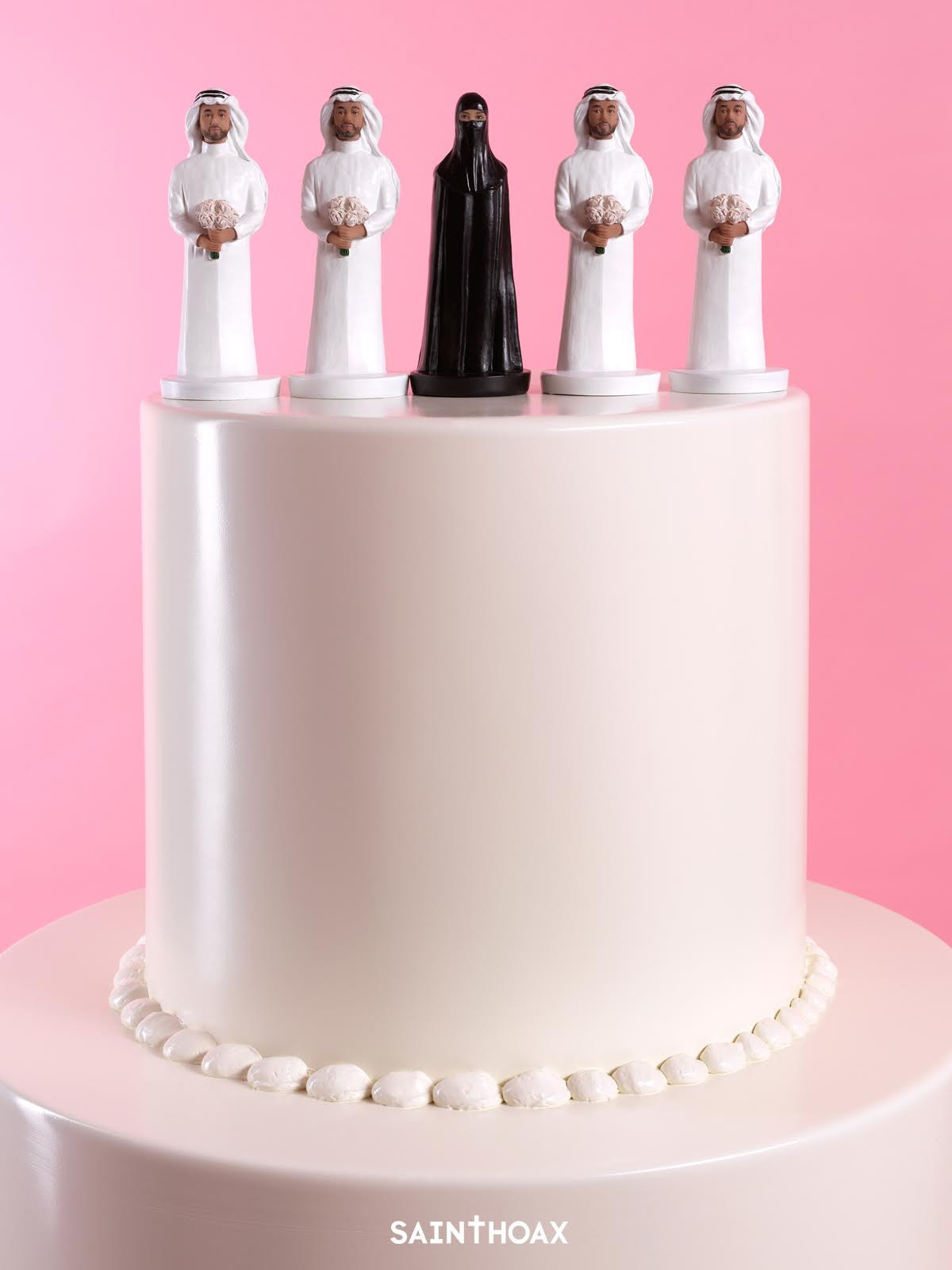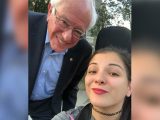
Instagram Artist Saint Hoax Talks Trump, Kim Kardashian, and Being POPlitically Incorrect
October 4, 2018 Off By أمير ضوA version of this article originally appeared on VICE Arabia.
Known for his witty artistic commentary on Instagram, Saint Hoax satirizes viral moments in American culture through kaleidoscopic pop references and twisted Disney imagery. While his 700k followers include the likes of Kim Kardashian, the pseudonymous Syrian artist's talents extend beyond social media: he's also a gifted painter and is about to unveil his third solo exhibit with Plastik Gallery, this time in Lebanon. The series, called MonuMental, was announced last week by parading a float that morphs Donald Trump with an armored tank through the streets of Beirut.
Saint Hoax granted VICE Arabia an exclusive interview and a sneak peak at the exhibit, which will include a large installation of a wedding cake topped with a Saudi bride flanked by four grooms, titled Just Desserts (2018)—a daring wink at the current state of affairs in the Middle East. We asked him about his preoccupation with American pop culture and why he wants to remain anonymous.
VICE: What's the aim of this balloon installation in Beirut, and why Trump?
Saint Hoax: This piece is on the cusp of entertainment and terror, similar to Trump’s political persona—which could be seen as amusing at times—but has also subjected so many minorities to the fears of an uncertain future. Like a balloon that is one pop away from being flattened.
Your upcoming show is called MonuMental. What do you mean by that? Can you tell us more about the show?
MonuMental is a play on words emphasizing the mental state of monumental figures. When someone’s fame becomes so exponential, it creates a clash between the way they perceive themselves versus the way the public perceives them. My upcoming show is an iconographic study of the pathos lurking beneath the immaculate façades of idols.
The exaggerated dimensions of the work are an immediate reflection of the icons’ magnified personas versus the vulnerability of the souls behind them. It fascinates me how vulnerable a public person is, when they’re subjected to people’s aspirations and expectations.

The themes in your work and the medium you use to disseminate your art are all inherently millennial, but this exhibit features a very traditional art form: oil paintings. Why did you choose this medium for MonuMental?
When I do oil paintings, my aim is to create something timeless. On the other hand, I think of my posts on Instagram as contemporary editorial cartoons (like the ones you see in traditional newspapers) using a new medium (social media).
You churn out satirical content on social media almost immediately after something happens. How do you process these things so quickly?
I happen to have a very quick photographic memory. When something happens in the pop world, I connect things instantly and merge many references together at once. I guess that’s why I’m able to come up with content so quickly. I love current affairs—to me, it’s a direct reflection of the masses, what they’re thinking and where they’re at. It reflects the current zeitgeist.
Using satire, you speak truth to power a lot in your work. What made you go in this direction artistically? Is there a personal story behind it?
Everyone appreciates humor. You can get away with so many things by adding "LOL" to a text message. It softens the blow and allows me to slide in some socio-political messages here and there.
You’re Syrian but you’ve chosen to focus on American pop culture in your work. Why is that? Does it resonate similarly with an Arabic audience, and do you plan to delve into Arab pop culture and politics too?
It’s not so much the fact that it’s American that captivates me, but rather how universal American pop culture has always been. It’s been imposed on us through the omnipresence of Hollywood and the idea of the “American Dream” in the media. In a way, it’s become a topic that unites people; an identity that belongs to everyone. I use it to poke fun at society and its ridiculous obsessions—which are also mine, in a way.
Millions of people around the world enjoy the wild sense of humor in your work. But are you actually funny in person?
I’d like to think so.
Why "Saint Hoax"? And why do you choose to remain anonymous?
A saint is someone who is meant to be pure, and a hoax is a misleading lie. When you put them together they create a beautiful contradiction, a "pure lie." This is the simplest way to describe my vision since I manipulate images and icons in a deceptive manner in order to tell a certain truth. I prefer to use my pseudonym to create a platform where I can express myself freely away from censorship. By removing the artist from the equation, it allows the art to become more open and universal.
Thank you for the Kim/Nicki Minaj edit, the world needed that. Tell me, how was it received and why did you do it?
You’re welcome. Well, I just saw the fight between her and Kourtney and wanted to give Kim a bit more edge by making her spew Nicki’s words. Nicki’s rap is so intimidating that it could win you any argument. Kim liked the post, so I’m guessing she must have chuckled.
You call yourself POPlitically incorrect. Tell me what that means?
The term "politically correct" has surged in the past decade. In a way, it’s great that this encourages people to become more mindful towards casual racism and discrimination in the ways that they express themselves. However, sometimes people can take it too far and interpret everything as offensive, which can be frustrating to artists who are left feeling suppressed and misunderstood. When it comes to my work, I wanted this sort of disclaimer for people to take my subjects with a pinch of humor and an open mind, so I came up with “POPlitically incorrect”: a caricature of pop culture and politics.
Sign up for our newsletter to get the best of VICE delivered to your inbox daily.


